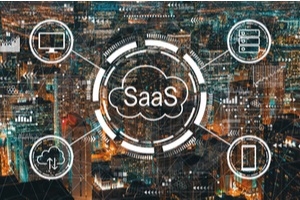The Software as a Service (SaaS) industry has been growing at a steady rate over the past decade and is projected to increase over the next few years. According to Statista, the market size doubled from 2014 to 2020 to 157 billion U.S. dollars. Finances Online predicts that the sector will reach a whopping $623 billion by the year 2023. With that said, it is clear why so many business plans today focus on selling SaaS applications.
SaaS is considered the present and future of selling and plays a key role in business strategy. This innovative technology differs from traditional software and therefore, requires a different type of selling. Learn more about SaaS, how to demonstrate value and how to determine which type of SaaS application to sell.
What Is SaaS?
Software as a Service is a subscription-based model that involves delivering cloud-based software to users via the web. With SaaS, users can enjoy all of the benefits of the software application without having to pay for development, servers, maintenance and security. There is no need to install or update software as it can be accessed over the internet, freeing users from hardware and software management.
SaaS offers multiple advantages over traditional software. It is easy to implement and debug, and is typically less expensive due to lower upfront costs. Software as a Service also has numerous applications, such as email services, automating sign-ups for services and products, auditing functions, managing documents, shared company calendars and customer relationship management (CRM) systems.
Of course, there are some drawbacks to consider. Data is stored on external services with SaaS, meaning companies must be sure that their information is safe and cannot be accessed by unauthorized personnel. Slow internet connections can decrease performance and SaaS solutions can suffer from a loss of control. More control is turned over to the publisher rather than the business.
Key Characteristics Of A SaaS Application
With SaaS, a service provider hosts an application at its data center and users can access it via the web. The vendor is responsible for providing customers with services such as maintenance, technical support and software upgrades. There are several features and characteristics of SaaS applications to consider:
- Automated Provisioning – Users must be able to access SaaS applications while on the go. This means that the process of provisioning the customers with the services must be automated.
- Multi-Tenant Model – This type of architecture involves multiple customers who share a common code base and software application infrastructure that is centrally maintained. Each customer is referred to as a “tenant” and has the capability to customize a part of the application.
- Subscription-Based Billing – SaaS application pricing is usually subscription-based, meaning customers can purchase the SaaS application when they need it and cancel when they do not.
- Application Security – SaaS applications require protection against a wide range of vulnerabilities. Identity and access management controls must be enabled to keep SaaS applications secure.
- Data Security – User data must be kept secure as SaaS applications are often shared by multiple tenants. Encrypting certain types of data can prevent it from being accessed by another tenant.
- Easy Customization – With easy customization, users can modify applications to better fit their business processes without impacting the common infrastructure. These customizations are exclusive for each user or business.
Leading Types Of SaaS Solutions
Cloud-based software solutions can be found for nearly any task, from social media marketing and live chat, to accounting and email. Here is a look at some of the top types of SaaS solutions that are dominating the industry.
CRM
Customer relationship management (CRM) software enables businesses to collect and store customer data in a secure and efficient way. Storing customer information effectively can help improve customer relationships and better protect the privacy of sensitive data.
CRM systems have multiple uses, such as the automation of repetitive sales tasks including emails. They can also help some users forecast sales, create sales reports and scale processes over time. Examples of popular CRMs include HubSpot, Salesforce, Pipedrive, Mailchimp and Zendesk.
HR
Every company should have a human resources (HR) department that is responsible for supporting and managing employees. This department performs a variety of tasks, such as recruitment, training and the administering of employee benefits.
HR SaaS software solutions can provide countless benefits to users, such as better employee management in regards to work schedules, sick leave, vacation time and the tracking of employee performance. Common examples of HR SaaS software include People HR, Breathe HR and Bullhorn.
Billing/Accounting

While billing and accounting SaaS solutions can be used in nearly any industry, they are most common in banking, manufacturing, retail, business services and government. Some of the most popular billing and accounting SaaS companies include Chargebee, Chargify and Quickbooks.
ERP
Enterprise Resource Planning software is geared towards large organizations and enterprises that need help managing their business processes in real-time. With ERPs, businesses can boost customer satisfaction and increase revenue. There are several key areas of ERP, including procurement, risk, accounting and project management.
ERPs are designed around defined schema and share a common database for interconnected workflows and normalized information. There are several key benefits to adopting ERP, including improved efficiency, reduced risk, consistent infrastructure and improved business insight. An example of an ERP solution is Oracle.
Project Management
Project management (PM) SaaS solutions help enhance progress tracking and cooperation amongst teams. These software solutions help streamline projects as they are considerably faster and easier to manage than shared spreadsheets and documents. In addition, synchronization occurs in real-time, ensuring that all team members have access to information and resources at all times.
PM SaaS is generally used by larger businesses in industries including finance, marketing, IT consulting and advertising. Some popular examples of project management SaaS solutions include Github, Trello and Basecamp.
Communications
Communication and collaboration SaaS solutions are utilized by many businesses across all sectors. These simple-to-use tools allow team members to search, organize and collaborate effectively. In addition, centralized workspaces enable partners, employees, customers and suppliers to communicate on a single platform.
Many communication and collaboration solutions can be integrated with other systems to ensure data consistency and prevent data duplication. Examples of popular communication and collaboration SaaS solutions include Slack and Google Drive.
Web Hosting/E-Commerce
Web hosting and e-commerce SaaS solutions can be useful for businesses that operate on the web. They often include content management systems such as WordPress, web hosting services, message boards and shopping carts such as Shopify. These e-commerce solutions provide businesses with the tools they need to do business online, such as cart management and payment integration.
E-commerce solutions are often SaaS-based but can also be Open Sourced. For example, Open-Source e-commerce solutions may include Zen Cart, Magento and OpenCart. SaaS-based solutions may include Volusion, Big Cartel and BigCommerce.
Demonstrating Value With SaaS
Companies can sell SaaS applications that perform a wide range of functions but these solutions are only lucrative if they deliver value to the customer. There are many aspects to consider when determining if a SaaS solution provides value and will meet the needs of the target demographic.
First, consider if it is really a SaaS platform. There are some hybrid solutions labeled as complete SaaS products but may have aspects that do not align with what a SaaS solution really is. True SaaS solutions require only a browser to run and all data is saved in the cloud. Complete SaaS solutions should not require the customer to install software or move from their current hosting provider.
Next, consider how reliable the SaaS solution is in terms of uptime and security. Many businesses can not survive long periods of downtime so it is important to ensure that the solution can handle multi-site traffic as well as sharp increases in traffic. Businesses are also responsible for keeping personal customer information secure. Ensure that the SaaS solution has the proper security features in place.

Ideally, the SaaS product should suit both current and future environments. Although SaaS products are made to run on web browsers, there is a risk that some solutions could become incompatible with older browsers. This incompatibility may appear in the form of inferior visuals or impaired functionality. In addition, applications should have mobile capabilities and be available for both iOS and Android devices. The SaaS product should also have a responsive design.
Finally, it is important to review the Service Legal Agreement (SLA). The SLA states what services customers will receive and what to expect from the product in terms of availability and quality. Service Legal Agreements should also outline what repercussions could result if the promised standards are not met.
Speak With A Custom Software Development Company
The SaaS model can provide modern businesses with countless benefits when properly implemented. Working with an experienced custom software development company can help organizations achieve measurable cost savings and revenue gains.
Orases is a full-service digital technology agency and a trusted partner of custom software, application development and website services. To learn more about how to determine which type of SaaS application to sell, contact the SaaS experts at Orases today.






